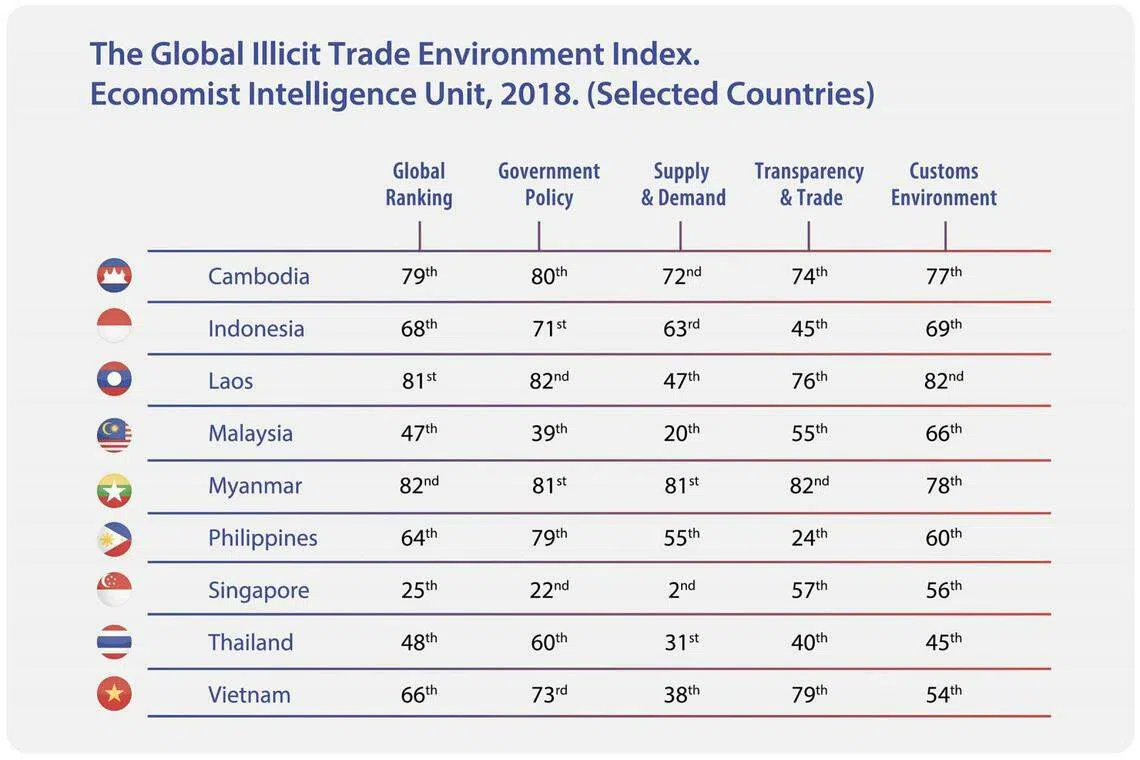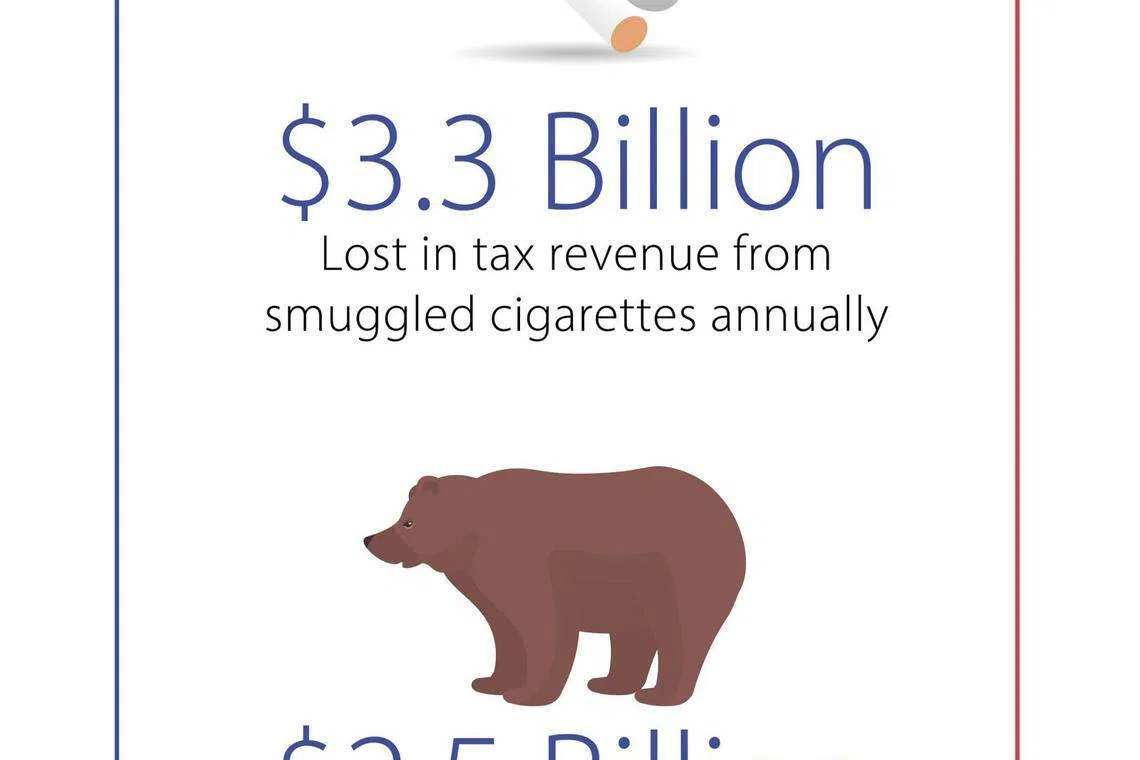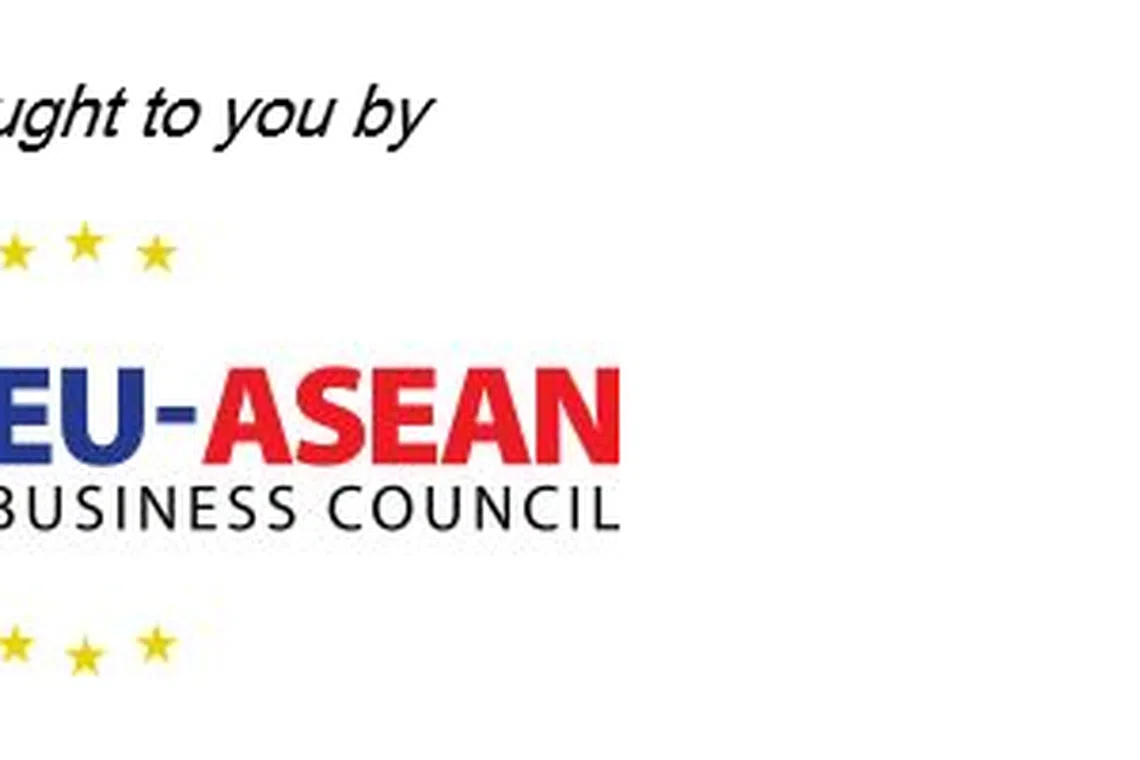Stamping out illicit trade in goods in Asean
Tackling the counterfeiting challenge amid a pandemic will demand a multi-stakeholder and multi-issue approach
As the Covid-19 pandemic swept its way across the globe and impacted health systems, stock markets and economies, the business of illicit trade found new strategies for profiting off the crisis. The Asean region is not immune to this scourge. A 2014 study by the Indonesian Anti-Counterfeiting Society estimated that the counterfeit goods trade deprived the nation's economy of up to US$4.8 billion (S$6.4 billion) per year.1 Similarly, Myanmar's illegal trade market amounts to US$4.6 billion per year.2
It is an issue that affects almost all sectors in Asean. However, some industries remain hotbeds of prohibited trade, either due to widespread demand for cheap alternatives, taxation policies or cross-border manufacturing chains. According to the EU-Asean Business Council's (EU-ABC's) recent report of unlawful trade activities in the region, key sectors impacted include pharmaceuticals, tobacco, alcohol, car parts, agri-chemicals and even toys.
In March 2020, the World Health Organisation (WHO) issued a medical product alert warning consumers and healthcare professionals of falsified items, especially in-vitro diagnostic products and laboratory reagents used in eight countries, including Singapore.3 Similar warnings came from the World Customs Organisation and the United States' Food and Drug Administration as illicit traders attempted to take advantage of newly instated export licences for critical medical supplies issued by nations facing shortages, including Vietnam and Malaysia.4 Globally, the counterfeit pharmaceuticals trade amounts to US$4.5 billion.

Covid-19 offered the perfect opportunity for criminals to use modern e-commerce channels and ineffectively enforced Customs procedures to exploit supply chain disruptions.5 The United Nations Office on Drugs and Crime (UNODC)6 estimates that 47 per cent of anti-malarial medicines tested in South-east Asia were found to be fraudulent.7 Substandard and bogus medicines are an urgent health problem for Asean as they may contain no, or inadequate amounts of, active ingredients, or may even have harmful ingredients. This poses a considerable threat to human lives and undermines confidence in healthcare systems and health professionals. Industry aims to guarantee the safety within the medicinal products distribution system by working cooperatively with all stakeholders. Measures focus on strengthening the accountability within the whole distribution system through tougher enforcement and stricter sanctions, as well as employing newest technology that has been proved to be more effective against counterfeiting.
High cigarette, alcohol taxes spur supply of cheaper, illegal substitutes
For the tobacco and alcohol sectors, the problem is often exacerbated by high taxation rates, import quotas and licence restrictions, and in some cases prohibition. High rates of taxation, for example, provide clear incentives to criminal gangs to smuggle both legitimate and counterfeit goods into key markets, such as Singapore in the case of cigarettes, as profits can be significant given the high prices for legitimate products. Over 20 per cent of Asean's adult population are smokers. However, despite the size of the prohibited trade in tobacco, no countries within Asean are parties to the Protocol to Eliminate Illicit Trade in Tobacco Products, which requires cooperation and information sharing between global organisations and Customs offices.8 Bans on e-cigarettes have also not dissipated demand for the items. Instead, they have led to a deprivation of revenue for governments and a loss of control on sales which can impact public health and safety.
Navigate Asia in
a new global order
Get the insights delivered to your inbox.

Illicit alcohol has also long plagued the region, with unlicensed distilleries packaging products to look like established brands or filling original bottles with counterfeit alcohol. This issue harms brand reputation and causes taxation shortfalls. More importantly, it has also taken lives, such as the 2018 spate of methanol poisoning cases in Indonesia which caused more than 100 deaths.9 Due to the high level of taxation of alcoholic beverages in Malaysia, Indonesia and Vietnam, imported liquors are expensive with the illicit types serving as cheap substitutes. Covid-19-related restrictions on the sale and distribution of alcohol have worsened the problem by incentivising unlawful suppliers to enter the market to meet the new demand. In the case of outright bans/dry laws, consumers have no alternative but to shift entirely to illegal markets. A WHO report in 2018 estimated that Asean would be the region with the highest consumption of unrecorded alcohol by 2025, with 4.5-6.2 litres of the illicit variety consumed per capita.10
Toys, games also targeted by counterfeiters
Even the toy and games sector is not immune to illegal trade practices. Asean's young demographics and expanding household income levels have contributed to the steady growth in demand for toys and games in the region. Coupled with the boom in e-commerce, this has sparked an increase in the availability of counterfeit toys. These items which are often of low quality and sold without undergoing the necessary safety testing and labelling requirements, have frequently been found to be dangerous and harmful for children.
In the automotive sector, the widespread penetration of counterfeit parts is a growing concern. A study commissioned by the Business Action to Stop Counterfeiting and Piracy (Bascap) and International Trademark Association (Inta) projected that the global economic value of counterfeiting and piracy could reach US$2.8 trillion by 2022.11 In Asean, the number of imitation parts being distributed continues to rise despite efforts by national governments and industry players. Imitation parts which are produced in large volumes include brake pads, brake discs as well as oil and air filters, all of which are critical to driver and passenger safety and vehicle performance. Consumers can be deceived by such parts as it is difficult to distinguish them from authentic ones simply by looking at the outer appearance.
As the EU-ABC has pointed out, tackling the illicit trade problem in the region requires a multi-stakeholder and multi-issue approach. Public-private sector collaboration will be key, both in helping to identify smuggled and illegitimate products and in sharing information. Public policy is also pivotal to reducing the incentives for criminals, while ensuring better law enforcement and improved Customs checks, particularly in free trade zones which are often used by traffickers to move illegal goods undetected.
References:

Decoding Asia newsletter: your guide to navigating Asia in a new global order. Sign up here to get Decoding Asia newsletter. Delivered to your inbox. Free.
Share with us your feedback on BT's products and services